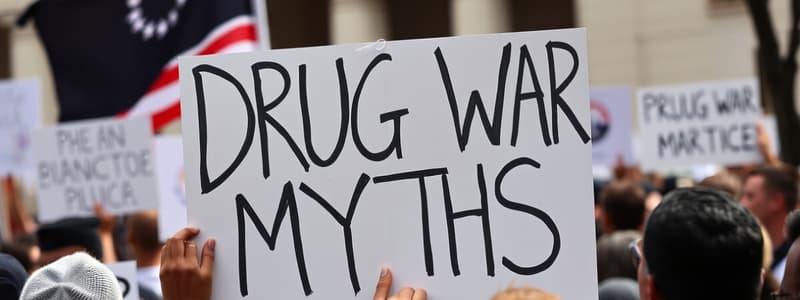Podcast
Questions and Answers
What does plea-bargaining under pressure often involve?
What does plea-bargaining under pressure often involve?
- Attorney representation
- Unjustified searches
- Both A and C (correct)
- Threats of extreme sentences
Which of the following is a myth of the war on drugs?
Which of the following is a myth of the war on drugs?
- The war is effectively eliminating drug use
- Targets are primarily kingpins (correct)
- 80% of arrests are for simple possession (correct)
- Most arrests are for violent crimes
There is a drug exception written into the Fourth Amendment.
There is a drug exception written into the Fourth Amendment.
False (B)
What is the probable cause exception?
What is the probable cause exception?
What are bus sweeps?
What are bus sweeps?
Citizens are generally willing to cooperate with law enforcement.
Citizens are generally willing to cooperate with law enforcement.
What is a fishing expedition in the context of police stops?
What is a fishing expedition in the context of police stops?
What are federal funding incentives for the drug war?
What are federal funding incentives for the drug war?
What is the primary purpose of SWAT?
What is the primary purpose of SWAT?
What significant change regarding civil forfeiture happened in 1984?
What significant change regarding civil forfeiture happened in 1984?
The civil asset forfeiture reform act removed the profit motive for law enforcement agencies.
The civil asset forfeiture reform act removed the profit motive for law enforcement agencies.
What percentage of defendants cannot afford legal counsel?
What percentage of defendants cannot afford legal counsel?
People often go to prison because they are wealthy.
People often go to prison because they are wealthy.
Who holds more power in the current legal system, judges or prosecutors?
Who holds more power in the current legal system, judges or prosecutors?
What is the 'Three Strikes Law'?
What is the 'Three Strikes Law'?
Most people convicted of felonies are placed on _____
Most people convicted of felonies are placed on _____
What restrictions do parolees face?
What restrictions do parolees face?
Flashcards are hidden until you start studying
Study Notes
Plea-Bargaining Under Pressure
- Many individuals plea-bargain without legal representation due to coercive tactics, including threats of severe sentences.
- This often affects vulnerable groups, such as children, who may be pressured following unjust searches or witness coercion.
Myths of the War on Drugs
- 80% of drug-related arrests are for simple possession, contradicting the belief that the focus is on high-level dealers.
- Significant rise in marijuana possession arrests contributed to substantial growth in drug-related arrests during the 1990s.
Arrests and Legal Exceptions
- There is no constitutional provision for a drug exception; the Fourth Amendment remains overlooked in drug-related arrests.
- Probable cause allows warrantless searches of vehicles, creating challenges for civil liberties.
Bus Sweeps
- Police utilize bus sweeps, questioning passengers and searching belongings without prior suspicion of illegal activity.
- The pressure to consent to searches complicates passengers' ability to refuse cooperation.
Federal Policing Practices
- Large-scale voluntary searches often target innocent individuals to catch a small number of criminals, with high failure rates (95-99% yielding no contraband).
- Federal funding encourages local law enforcement agencies to actively participate in drug enforcement, easing budget burdens.
SWAT and Police Tactics
- SWAT teams, initially designed for emergency situations, are frequently deployed to serve warrants against suspected drug offenders.
- Civil asset forfeiture legislation allows law enforcement to seize property suspected of being related to drug offenses without a criminal conviction.
Civil Forfeiture Practices
- Since 1984, agencies can keep up to 80% of seized assets, incentivizing profit through civil forfeiture.
- Reforms may address some issues, but they fail to eliminate the profit motive or ensure legal counsel for the affected.
Indigent Defendants and Legal Representation
- 80% of defendants cannot afford legal counsel, leading to rushed plea-bargaining, especially in drug cases.
- Children often lack adequate parental guidance, increasing their vulnerability in legal situations.
Impact of Poverty on Imprisonment
- The inability to afford a defense attorney results in a reliance on plea-bargaining, disproportionately impacting the poor.
Power Dynamics in the Legal System
- Judges have diminished sentencing discretion while prosecutors wield significant power due to mandatory minimum sentences.
- Prosecutors can influence charges and sentencing severity, determining outcomes for defendants.
Disproportionate Sentencing for Drug Crimes
- Lengthy sentences for drug offenses often exceed those imposed for serious crimes in other wealthy nations.
- Harsh penalties for drug-related offenses contribute to recidivism, particularly among young offenders.
Three Strikes Law
- This policy ensures that offenders committing three or more violent crimes face harsh penalties, typically 25 years to life without parole.
Parole Conditions
- Individuals on parole must adhere to strict conditions, including travel limitations, interactions with other felons, and regular check-ins with parole officers.
- Failure to comply with these conditions can lead to immediate reincarceration.
Studying That Suits You
Use AI to generate personalized quizzes and flashcards to suit your learning preferences.




